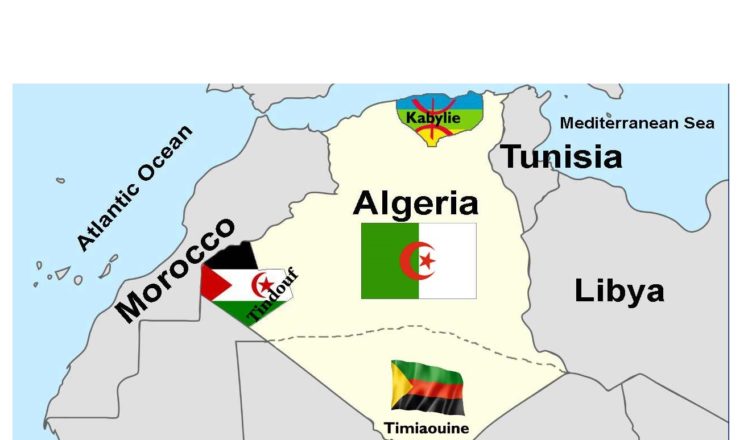To understand the profound crisis in Algeria today, one must go back to the collapse of communism in Eastern Europe and its disastrous impact on Algeria, a country traditionally aligned with the Eastern Bloc. The collapse of communist regimes resulted in an unprecedented political and economic vacuum, and Algiers was unable to respond to these upheavals coherently.
Today, Algeria, as a country born from the decolonization of French colonial rule in 1962, is on a path toward division, much like what happened to Yugoslavia in the 1990s and Czechoslovakia in 1992. Currently facing a severe economic crisis due to mismanagement and ill-considered political decisions by the military junta, Algeria stands at a decisive crossroads in its history, where critical decisions will need to be made to address the demands emerging from various regions, including a Kabyle state in the north and another state in the south, according to Western experts.
In the north, there are independence movements in Kabylie that advocate for complete independence. In the south, the Saharan region has witnessed sporadic clashes between the Algerian army and rebel groups, reviving autonomous aspirations among some communities.
Over the decades, Kabylie, a region located in northern Algeria with predominantly Berber inhabitants, has expressed demands for autonomy and even the creation of an independent Kabyle state. Kabyle activists, advocating for the recognition of their cultural identity, language (Tamazight), political rights, and autonomy, face repression by the military regime. Arrests, legal prosecutions, and the banning of gatherings and protests are common.
Nonetheless, the Kabyle state is a geo-historical reality with its territory, culture, and 10 million inhabitants. The independent Kabyle Republic existed before the establishment of Algeria. In 1857, 20 years after the decree creating French Algeria, Kabylie was annexed. After decolonization in 1962 and forced coexistence, the Kabyles continue to resist the dominance of the military regime in Algiers.
« The Kabyle people are on the verge of completing an important stage in their march toward reclaiming their freedom, which was seized from them since June 24, 1857, at the Battle of Icheriden. Now, they are determined to peacefully regain what was forcibly taken from them. Neither prison nor the genocidal war being waged by Algerian generals against the Kabyle nation can save their colonial rule over Kabylie, » announced President Ferhat Mehenni.
Ferhat Mehenni, President of the Kabyle government in exile and the Movement for the Self-Determination of Kabylie (MAK), calls for the decolonization of Kabylie and its inclusion on the list of non-self-governing territories of the UN and the African Union. He participated in a UN meeting on human rights.
As for the conflicts in southern Algeria, they reflect several complex issues that have evolved over time. The southern region of Algeria is characterized by great ethnic and tribal diversity, with Arabs and Tuaregs and various communities living in the area.
In some parts of southern Algeria, criminal groups and traffickers, protected by Algerian officers, have thrived by exploiting vast, sparsely populated territories. This has led to conflicts with local populations and other groups, such as movements seeking the liberation and independence of the South. They argue that they do not receive an equitable share of the country’s resources. These claims have resulted in clashes with Algerian security forces.
Today, with decades of frustration and repression of these populations, the Algerian regime is facing an alliance between movements in southern Algeria and those in Azawad in northern Mali.

